Are Bats Attracted to Lights? No, With One Exception
Author: Rick Worst | Editor: Omar Alonso
Review & Research: Jen Worst & Chris Miller
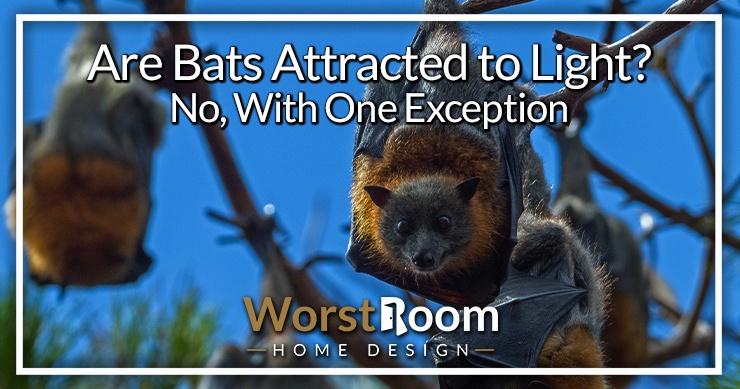
A common question that has bothered scientists for ages is "are bats attracted to lights?" Well, after thorough research and studies, they've finally discovered the answer! Just like other nocturnal creatures, bats are not attracted to lights in general. Since bats use their echo-locating system to prey, they don't really need light for any assistance.
Moreover, their eyesight is also pretty remarkable, even in the darkness. So, want to know more about the relationship between bats and lights? Mellow out and enjoy the details below.
Do Bats Hate Light?
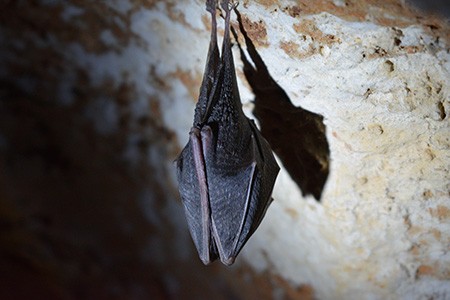
Well, bats don't really hate the light. Instead, bats avoid light. The eyesight of a healthy bat is so incredible that it can see through a long distance with minimum light intensity. That's not all; they can even see UV rays which are off the table for humans. In fact, bats get disturbed when they are exposed to light.
And this fact was proven by researchers as they noticed bats crawl away to darkness, especially when exposed to direct sunlight or other light sources. So, to conclude, it won't be correct to state bats hate the light (as they need it in some cases). Instead, they don't really like it. Do bats like lights? Not at alll.
What Type of Light is Comfortable for Bats?
Bats can endure any light source unless it triggers their mood. As they are used to living in darker areas, so they might be slightly sensitive to the light at first. However, scientists confirmed that bats are fond of ultraviolet (UV) rays that come from sunlight.
Therefore, bats can quickly identify and make good use of it for their benefit. The UV ray allows the bats to see their prey when their echo-locating ability somehow gets disrupted.
Why are Some Bats Attracted to Light?
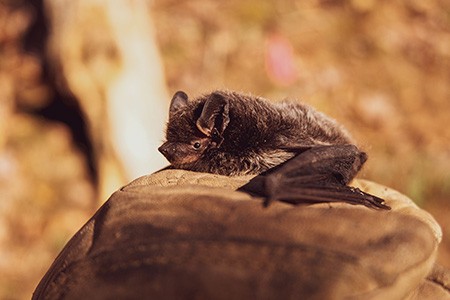
There are a total of 1200 species of bats, and each species contains different characteristics. Astoundingly, some of these species have an unexpected attraction toward light sources.
Now you may wonder why some of these bat species are attracted to light. Well, as mentioned earlier, bats have excellent eyesight. But not every kind is blessed with this type of eyesight.
Since some come with the misfortune of blurry vision, it makes them dependent on light. And you're most likely to notice such species roaming around street lamps, bright areas of the streets, and even in your house.
Another significant reason bats are attracted to lights in areas covered with insects at night, especially in household areas. So does light attract bats? You could say that, but it's often about finding insects near them.
So, as these bats can't effectively hunt due to their blurry eyesight, they tend to hunt the insects around your home's light bulbs. And since bugs like termites are attracted to lights, you may find bats in the vicinity, too.
Will Using Light Help Deter Bats?
Do lights deter bats? There are chances that you can use light to drive the bats away. However, do remember this, light does no direct harm to bats. It only disturbs them. And you may need some type of flashlight rather than simply turning on an outdoor light fixture to make this effective.
Therefore, improperly using this method may invite more bats to your home areas. Unknowingly, you're actually forcing them into your home. And this can even be a great mess.
So, you now have two options. Either call professionals (which isn't fun for your pockets) or use the light the right way to drive the bats away. We've explained the ways in the section below. So are bats attracted to light at night time? Not only are they not but it deters them when used correctly.
How to Use Light to Scare Off Bats
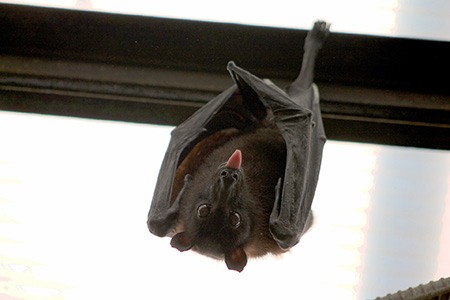
Are bats scared of light? Do bats avoid light? Yes, or at least they flee it. Seeing a bat flying around your house is as good as a nightmare. However, you need to stay put and think of certain measures that'll easily get rid of these bats. Here we've mentioned some of the necessary actions that you can consider.
In Case of One Bat Inside Your Home or Garage
Bats that get inside your house through windows are usually lost baby bats. So, the best way to get these bats out is not by chasing them but by creating a way out and guiding them to it.
- Just close all the windows and doors of the house except that one door or window that leads outside.
- Now turn off all the lights and shine a flashlight towards the way out of your house through the open window. The bat should follow the ray to make its way out.
The young bat is safe, you’re happy, and no damage was done to your house. You couldn’t ask for a better outcome.
Other Ways to Drive a Bat Away Besides a Light Source
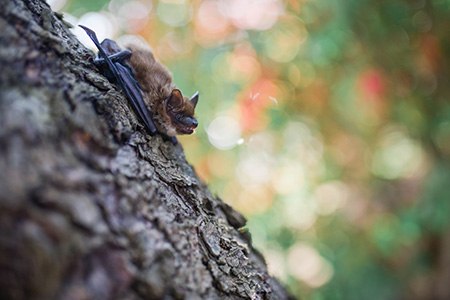
Light isn’t the only way to repel a bat or get it out of your house or garage. Let’s look at a couple other options.
You can also use ultrasonic sound to drive bats away. Humans can't hear this sound, but bats can. The ultrasonic sound can scare off the bats and prevent them from coming near your house at night. As bats use the echo-locating system, it would be annoying for them to come near your home due to the emanation of the sound.
For daytime bats, which should be a rare occurence, you can try using aluminum foil paper. This reflects sunlight and causes discomfort to the bats. Not only does it scare them off (you can use this trick to keep birds off your porch, too), if they are around, but it causes them to not even come close once they catch a reflection off of the aluminum foil.
We've mentioned the rare cases when bats with poor eyesight will use lights as a way to find bugs to eat, knowing the bugs will be flying all around. This is why you sometimes hear people say that bats and porch lights are a match made in heaven. But it's really all about "bats and bugs." Do lights attract bats? No, but bugs do.
In Case of Multiple Bats
If none of your doors or windows is open, but you still notice a bat flying inside your house, then there are chances of the presence of multiple bats. You might think that's impossible, but know this: bats are super quiet and might be in your attic for weeks without you even noticing. So, here's what to do in such situations:
Handling a colony of bats is not a child's game, especially if you're not an expert. So, the best of all solutions would be to take the assistance of wildlife experts. However, before hiring any such agencies, always consult whether they have bat removal services or not. Also, ensure you discuss the overall pricing of the service.
The right professionals will always help you to seal any possible entrances to eliminate any future re-entry chances.
Safety & Legal Precautions for Scaring Off Bats
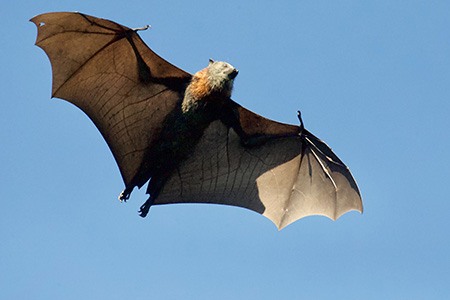
Never catch a bat with bare hands. Since bats carry rabies, there are always chances of infection. That's not all; they can carry other severe human-infecting diseases. Plus, catching a flying creature is really tough; you can fall and hurt yourself.
Bat removal during the middle of summer isn't appropriate. It is the baby bat season, so the eviction season is limited before and after this period.
Cleaning up bat droppings is a bad idea. Bat guano can carry lethal fungus; if you are not careful with it, it may spread.
Never even think about killing or poisoning a bat. In many countries of the world, bats are a protected species. Additionally, the ecosystem also gets severely affected due to such actions.
Are Bats Attracted to the Warmth of Light?
No, bats aren't attracted to light for warmth. The ideal temperature range for bats is 35 to 40-degree celsius, and heat is required for bats only when they are sleeping or giving birth. Do bats fly towards light? No, only very rarely in search of bugs to eat.
Are Bats Attracted to Lights? No, Not in General
So, in brief, except for the bats with vision issues, no other bats are attracted to light at all. They stick around these lights to take on insects for food. Yet, researchers haven't found any other significant reasons why some bats stay around the light.
The not entirely obvious answer to the question "are bats attracted to lights" is indeed a no. Although some bats tend to hover around the lights, that's only when they have blurry vision and can't go hunting.



